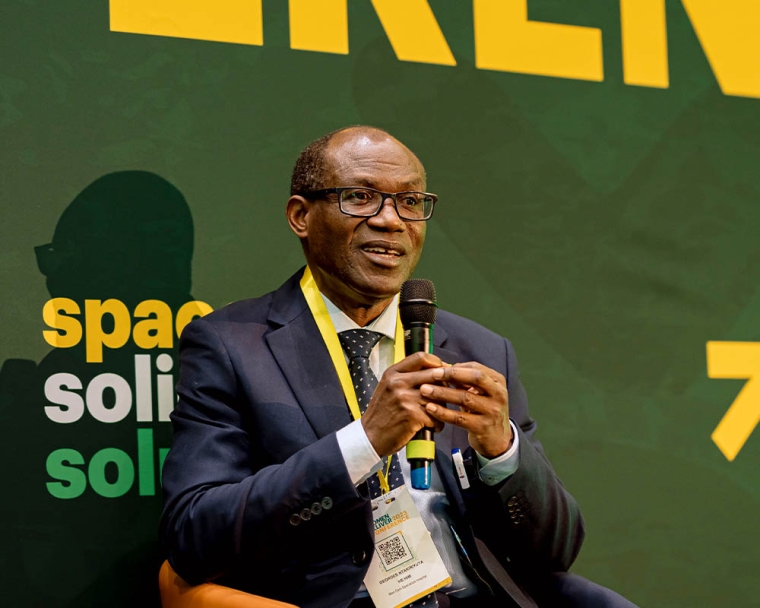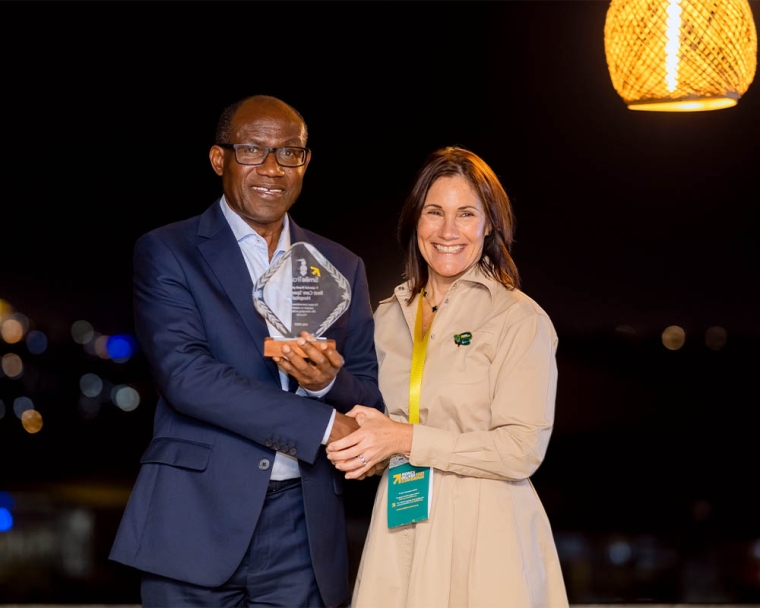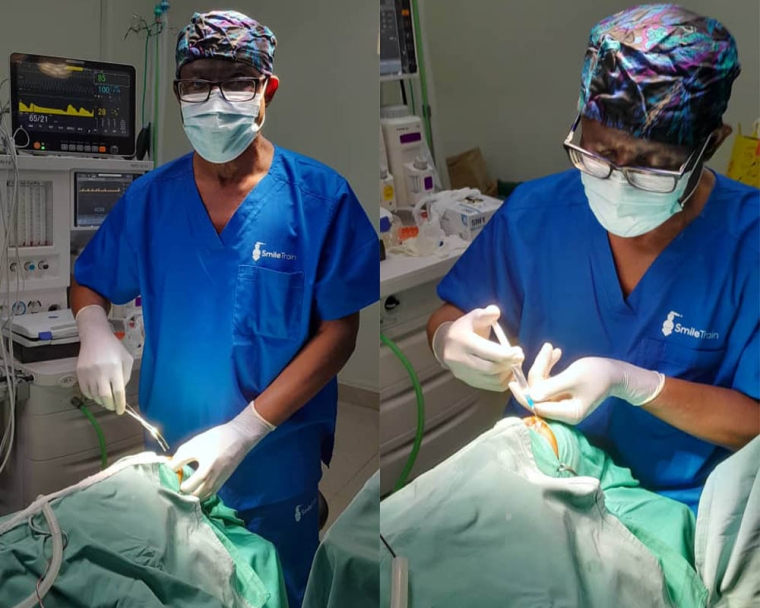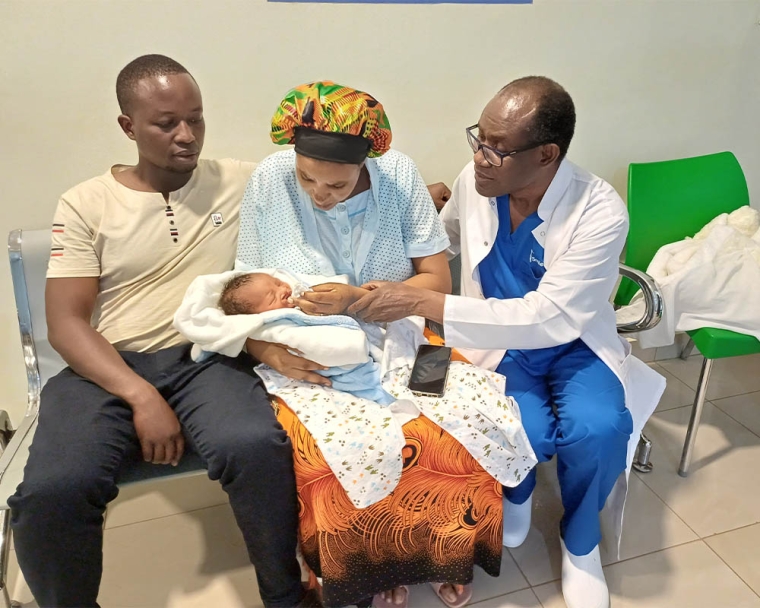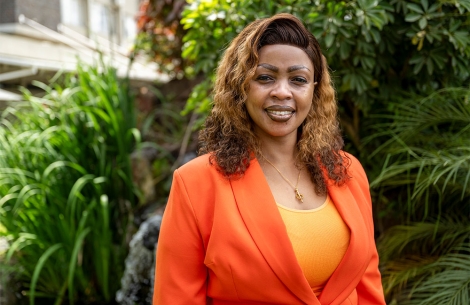Dr. Georges Ntakiyiruta: "Smile Train Allows Me to Serve My People”
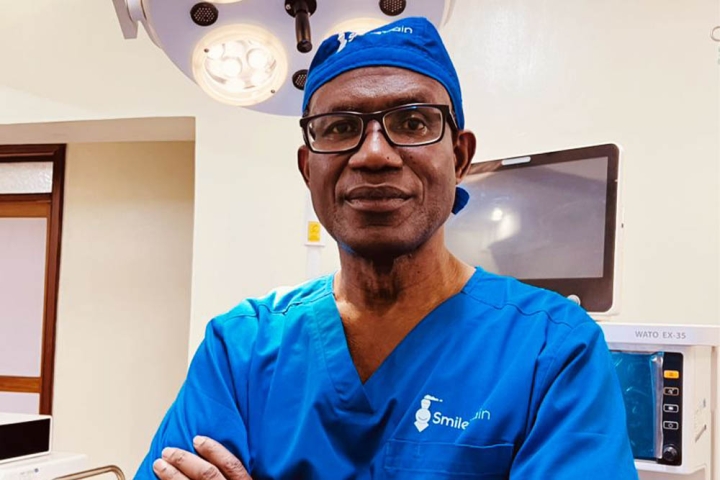
Dr Georges Ntakiyiruta is a Smile Train Partner based in Kigali, Rwanda. He trained as a Cleft Surgeon at the Makerere University in Uganda. Upon His return to Rwanda, he kept honing his skills as a cleft surgeon and is the academic Head of Surgery at the University of Rwanda.
Dr. George intimates about how he became a cleft surgeon, the successes and challenges he faces, and how the collaboration with Smile Train, and has so far, has led to more than 1,000 life-saving cleft surgeries.
Journey to becoming a Surgeon
I did my medical education at the University of Rwanda. After I graduated in October 1989, Kibogora Missionary Hospital offered me an internship. My mentor was Dr. Glenn Snyder, an internist. If I had had an opportunity to specialize then, I would have become an internist.
My first official appointment was at Mibirizi Hospital, where I worked as a general practitioner (GP).
The 1994 genocide against the Tutsis devastated the whole country and destroyed the health system. In 1998, I returned to work at Kibogora Hospital as a GP again. There, I had the opportunity to work with an American surgeon, Dr. Frank Ogden, who was also visiting Kibuye Hospital in Burundi. While working with him, I picked up an interest in surgery. He became my mentor. When he went away to visit Kibuye, I was left in charge of surgery.
I also worked with many other visiting surgeons, including Dr. Marlene Long, a cleft surgeon who was working for the African Medical and Research Foundation (AMREF). The first time I saw cleft surgery was with Dr. Long. She invited me to a plastic and reconstructive surgery course that was held in Jinja, Uganda. Although there was no surgical training available in Rwanda, I made up my mind then to specialize in surgery. I applied to Makerere University in Uganda, and I was accepted. After completing my training, I came back to work at Kibogora Hospital as a surgeon. I had other opportunities to work with visiting AMREF cleft surgeons, such as Dr. Edward Wayi (from Tanzania) and Dr. Asrat Mengiste (from Ethiopia) when they came to do cleft surgery at Kibogora Hospital. When Dr. Asrat took over from Dr. Long, he invited me to many more plastic and reconstructive surgery courses, and I kept improving my cleft surgical skills.
In August 2008, Prof. Kakande Ignatius (from Uganda), who was one of my teachers at Makerere University, was tasked with starting a surgical training program at the University of Rwanda. He invited me to join him and be part of the faculty. That is how I was involved in surgical education, and later became the academic Head of Surgery at the University of Rwanda.
Inspiration Behind the Partnership with Smile Train: A Collaborative Journey
Dr. Mengiste and Dr. Wayi were already Smile Train partners in their countries. Whenever they came to Rwanda, they invited me to work with them. They wanted to build our capacity and mentored a team that included a surgeon, anaesthetists, and nurses. They knew that it was important to empower the local healthcare providers to continue to provide safe, high-quality cleft treatment once they left.
Later, Smile Train reached out to me formally, and I was soon accredited as a Smile Train partner surgeon in Rwanda.
During that time, I saw many patients with clefts, both adults and children, who had nowhere else to go for treatment. I really wanted to do something for them.
On the Transformative Impact of Smile Train's Initiatives In Rwanda
Without Smile Train, children and others with clefts here would be left without many treatment options. When I started my collaboration with Smile Train about 10 years ago, I was a lecturer at the medical school and was doing surgery at the University Teaching Hospital of Kigali. Although I had skills in cleft surgery, I could not schedule any because we were always overwhelmed with medical emergencies. I had opted to do cleft surgery at a nearby district hospital in Nyamata. But even there, there were times we had to stop our cleft surgeries because the two operating rooms were busy with emergency cesarian sections.
In 2015, I decided to start Best Care Specialists Hospital (BCSH), a private hospital for surgeries, including cleft surgery. We are partners with Smile Train, and so far, with their support, we have performed more than 1,000 cleft surgeries.
Back then you would see many adults with clefts in Rwanda. Today it is very rare to see that, and I believe that I have contributed to that happening. Nowadays, we are mainly treating children.
The birth of a child with a cleft is always a difficult experience for the family. Knowing that there is a prospect for cleft treatment brings relief to the lives of many families. Very often, I used to hear sad stories of how children with clefts are discriminated against and bullied.
On Elevating Care for Children with Clefts: Impact of Partnership with Smile Train
Before starting a partnership with any healthcare centre, Smile Train assesses the facility to ensure that the patients will be treated in optimal conditions. This helps improve the quality of treatment for other conditions, too.
We healthcare providers are also assessed before we are approved. Smile Train ensures that the cleft team members they support are well trained, especially in patient safety, by leading us through Basic Life Support, Pediatric Advanced Life Support, and Nursing Care Saves Lives trainings, among others. They also ensure that their partner providers have adequate surgical instruments and patient monitoring tools and even offer a platform for surgical self-learning, the Virtual Surgery Simulator.
Partnering with Smile Train has made me a champion for patient safety, as well. In 2017, I was awarded a PLASTIC SURGERY FOUNDATION / SMILE TRAIN International scholarship, which allowed me to experience how cleft care is provided in the US. I was privileged to observe the work of prominent cleft surgeons at Boston Children’s Hospital, and the lessons from that scholarship helped me further improve the quality of care in my hospital.
Babies with clefts often cannot feed, leading to malnutrition, which makes surgery impossible. So, Smile Train also gives us the resources we need to nurse these babies to optimal health, so they are ready for surgery.
On Empowering Through Cleft Care: Long-Term Impact
Cleft care is life-changing in many ways. Healing a cleft also heals families. We have seen families that are destroyed by the birth of a child with a cleft, then stitched back together as a result of the surgery. In all cases. children who have had cleft treatment will generally go to school and live better lives than those who did not receive it.
Multiplying Impact Through Partnership: A Vision for the Future
We are very proud of our partnership with Smile Train. Many people already know our hospital as a cleft centre. So far, I have already operated on more than 1,000 cleft patients, including more than 450 of them at Best Care Specialist Hospital over the past two years.
Inspiring Patient Experiences: A Glimpse of Hope
Whenever I think about patient experiences, I remember Rukundo Janvier, 21 years old.
He told us that he received a cleft surgery as a child but does not remember it. The surgery did not heal well, leaving permanent scarring on his lip and a huge hole between his mouth and nose.
Because of this appearance, Rukundo did not go to school. He could not bear the bullying from the other children.
His parents did not know it was possible to revise the previous surgery, and assumed they would never be able to afford it even if it was, so did not seek medical help.
At 15, Rukundo ran away from home and lived on the streets of Kigali. He had no place to stay and survived by doing odd jobs like loading and unloading charcoal trucks.
People took advantage of him. When he heard about the treatment opportunity at BCSH, his employer scared him by telling him that he would die if we operated on him. They did not want him to receive treatment because the stigma left him without many opportunities to look for different work — they wanted to make sure he always felt inferior to other people so that he would continue to work for them for almost no pay.
But Rukundo did not listen to them. He wanted to get rid of this stigma and decided to come for a consultation. We told him that we could do the surgery for free and gave him an appointment. When he went back and he told his employer, they became angry and denied him food that night.
Still, Rukundo came back and had a successful surgery.
Afterwards, he was happy and very grateful. He was able to return home at last to see his family whom he had not seen in years.
Addressing Challenges in Cleft Care in Rwanda
Although Smile Train supports us to provide cleft care in our country, we are still limited in our ability to mobilize patients. Though one would expect that patients would come spontaneously to receive cleft care, unless we make a radio announcement, they do not come. I have also noticed that it is particularly hard to get those who developed complications from previous surgeries done elsewhere in for a consultation.
In my opinion, we should be able to work with the community. We need to have at least one community health worker specifically trained in cleft treatment in every district, and we should be able to meet with them on a regular schedule. We should also be able to visit our patients at home and understand the challenges they face on their side.
Another challenge remains the cleft palate. Mothers have difficulty breastfeeding these babies because their cleft palates make them lose the milk through their nose or choke on it. Many develop malnutrition, which can sometimes turn deadly.
Transforming Lives Beyond Surgeries
In addition to sponsoring free surgeries, with Smile Train’s support, our center is able to offer a nutrition program to help save babies from dying of malnutrition before surgery is even possible.
Gratitude for Smile Train's Impact
The sad truth is that access to surgery is still limited, especially in low-resource countries. It is even more difficult for people with clefts. Clefts can destroy family life and negatively affect many people.
Smile Train has empowered us to provide quality cleft care to all patients with clefts.
I am very grateful to Smile Train for allowing me to serve my people.
Gallery
